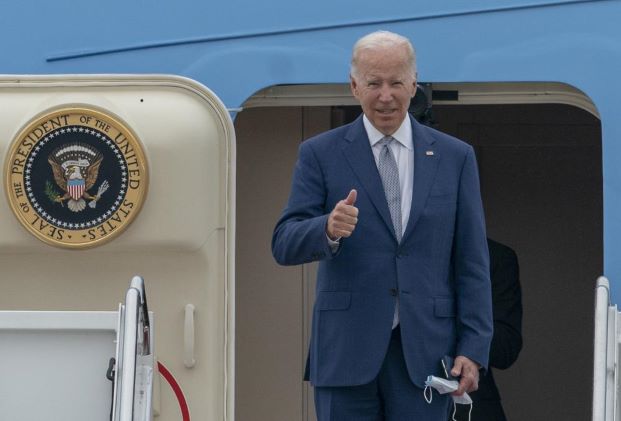
Written by: Marah Bukai
As President Joe Biden prepares to visit the middle east, his first visit will be to the state of Israel.
However, Questions remain in regard to the priorities on Tel Aviv’s agenda, and if there are any indications on the reason that make President Joe Biden will head directly to Saudi Arabia after his visit to Israel? And how could Biden’s visit be impactful to advance the peace process in the Middle East, which he repeatedly spoke about to journalists after confirming his visit to the Saudi Kingdom? A visit that received heavy opposition from the hard left in the American Democratic Party, specifically to the highly anticipated meeting with Saudi Crown Prince Mohammed bin Salman.
Prince Mohammed bin Salman is the second man after his father, King Salman Bin Abdelaziz, and DeFacto ruler of the kingdom today.
Israeli Foreign Minister Yair Lapid, who will be prime minister when Biden visits, had spoken at a recent press conference. He was quoted by the Jerusalem Post about his expectations about the visit, saying: “Everyone is looking forward to Saudi Arabia these days,” and added, “The “President Biden went straight from here to Saudi Arabia likely indicating a connection between the visit and the ability to improve relations between the two countries.”
Lapid’s aspirations did not stop at this statement. Rather, it seems that Israeli leaders are placing great hopes on this visit. Lapid hopes to motivate other countries to join the “Abraham agreements” that Israel made during the era of former President Donald Trump. This agreement has been joined by countries such as the United Arab Emirates and Bahrain, as well as other parallel agreements it concluded with Morocco and Sudan. Lapid was clear when he announced at the conference, “We have a list of countries targeted to enter into peace agreements with us, foremost of which is the Kingdom of Arabia (Saudi Arabia), along with other countries such as Indonesia.”
A concern for the Israel state is that the Saudi Kingdom has stood firmly for many years, as a strong supporter of the rights of the Palestinian people on their historical land. As well as the establishment of their state alongside the State of Israel. Especially during the reign of the current King Salman bin Abdulaziz
In 2004, the Kingdom launched the “Arab Peace Initiative,” which was unanimously approved by the Arab countries during the Arab Summit Conference held in the Lebanese capital, Beirut, in 2002.
Among the most prominent provisions of the initiative was the item that stipulated “reaching a just solution to the Palestinian refugee problem to be agreed upon in accordance with United Nations General Assembly Resolution No. 194” and “accepting the establishment of an independent and sovereign Palestinian state on the Palestinian territories occupied since June 4, 1967, in the West Bank.” and the Gaza Strip, with East Jerusalem as its capital.
In the event that these two conditions are met, the Arab countries, in return, “consider the Arab-Israeli conflict as over, and begin to enter into a peace agreement between them and Israel to achieve security for all countries in the region, which includes establishing normal relations with Israel within the framework of this comprehensive peace.”
Another prominent issue that will be at the top of the Israeli and Saudi agendas with President Biden revolves around the common danger that both countries suffer from at the same time. Which is Iran’s intrusion and its continuous attacks on the countries of the region, and its nuclear threat to the Middle East region and the entire world. This is worrying, because Iran has no useful deterrent so far.
Israel wants a nuclear agreement that is more advanced than the one signed in 2015 with Tehran, and the Saudi Kingdom also denies this agreement and considers it insufficient to deter Iran from its nuclear arms ambition. Iran is months away from completing it and obtaining all the tools and bases for building its nuclear bomb.
In light of these common threats and fears, last February, Israel carried out a naval maneuver led by the United States that extended over the area of the Persian Gulf, Gulf of Oman, Red Sea, Arabian Sea, and the northern Indian Ocean, covering the maritime belt surrounding the Gulf states as a whole.
It was remarkable that, for the first time, the Kingdom of Saudi Arabia and the Sultanate of Oman joined in a joint Israeli-American maneuver, two countries that do not have diplomatic relations with Tel Aviv. At a time when the latter is establishing full normalization relations with the United Arab Emirates and Bahrain.
The questions that arise now are, will President Biden, on his first visit to the Middle East, be able to find a way out of these difficult political and security straits that the region is suffering from and that threaten possible confrontations that may ignite a major war involving all parties under the direct Iranian threat? Will the issue of Palestine, which is central to the Saudi Kingdom, be one of the priorities of the talks between the US and Saudi parties? So that the Arab Peace Initiative can be developed in line with the new regional situation without modifying its substance?
The one-million-dollar question is, will Biden’s visit be the road that will pave an additional path for Israeli-Arab relations, especially with the Saudi Kingdom?
When Lapid was asked about the possibility of President Biden’s plane carrying Israeli officials to participate in the talks on the kingdom’s soil, Lapid joked: “I don’t know, but President Biden’s plane is big and always has room.”
Translation and editing by:
Abraham Darwish
Senior English Editor, WHIA
